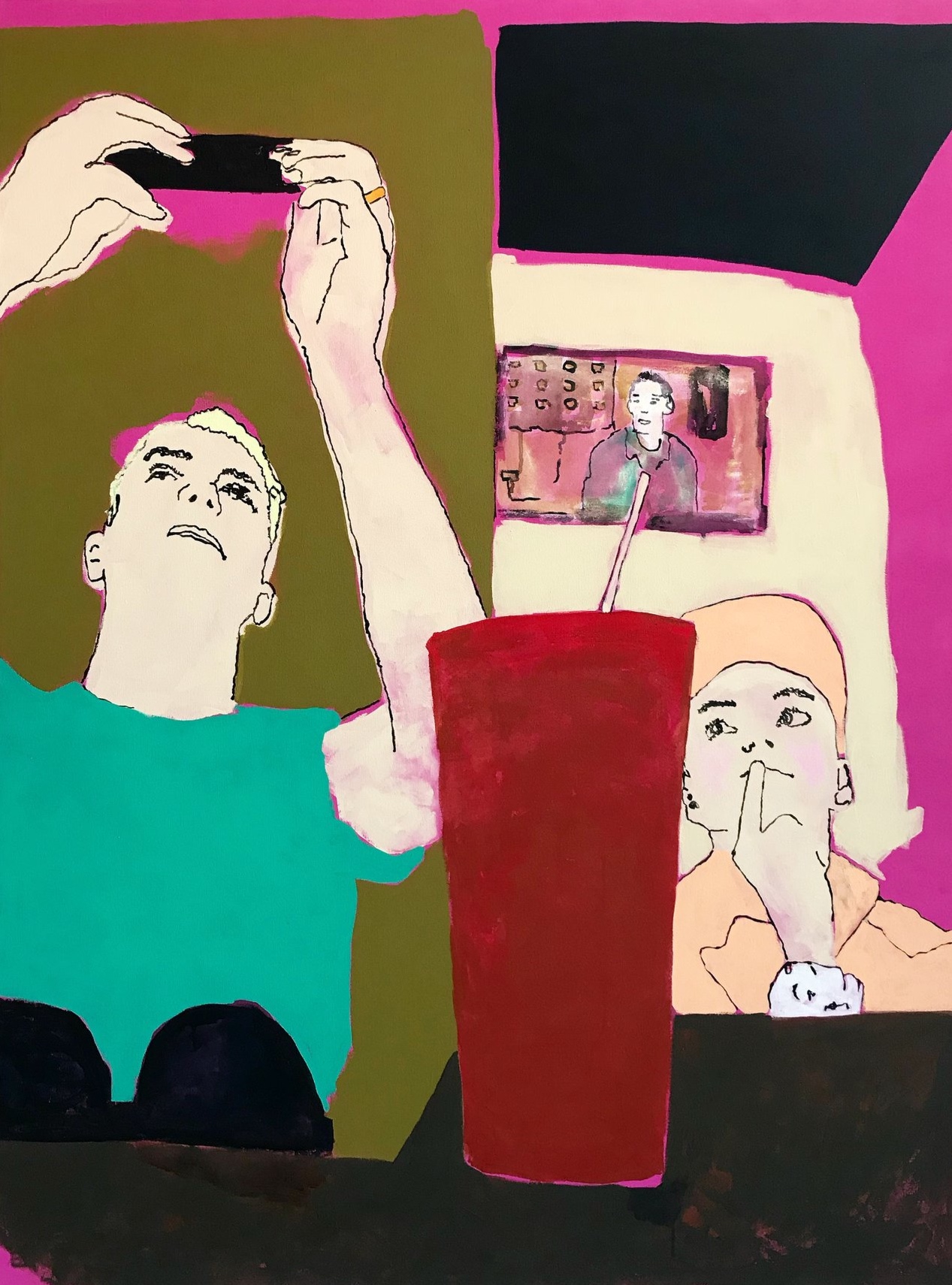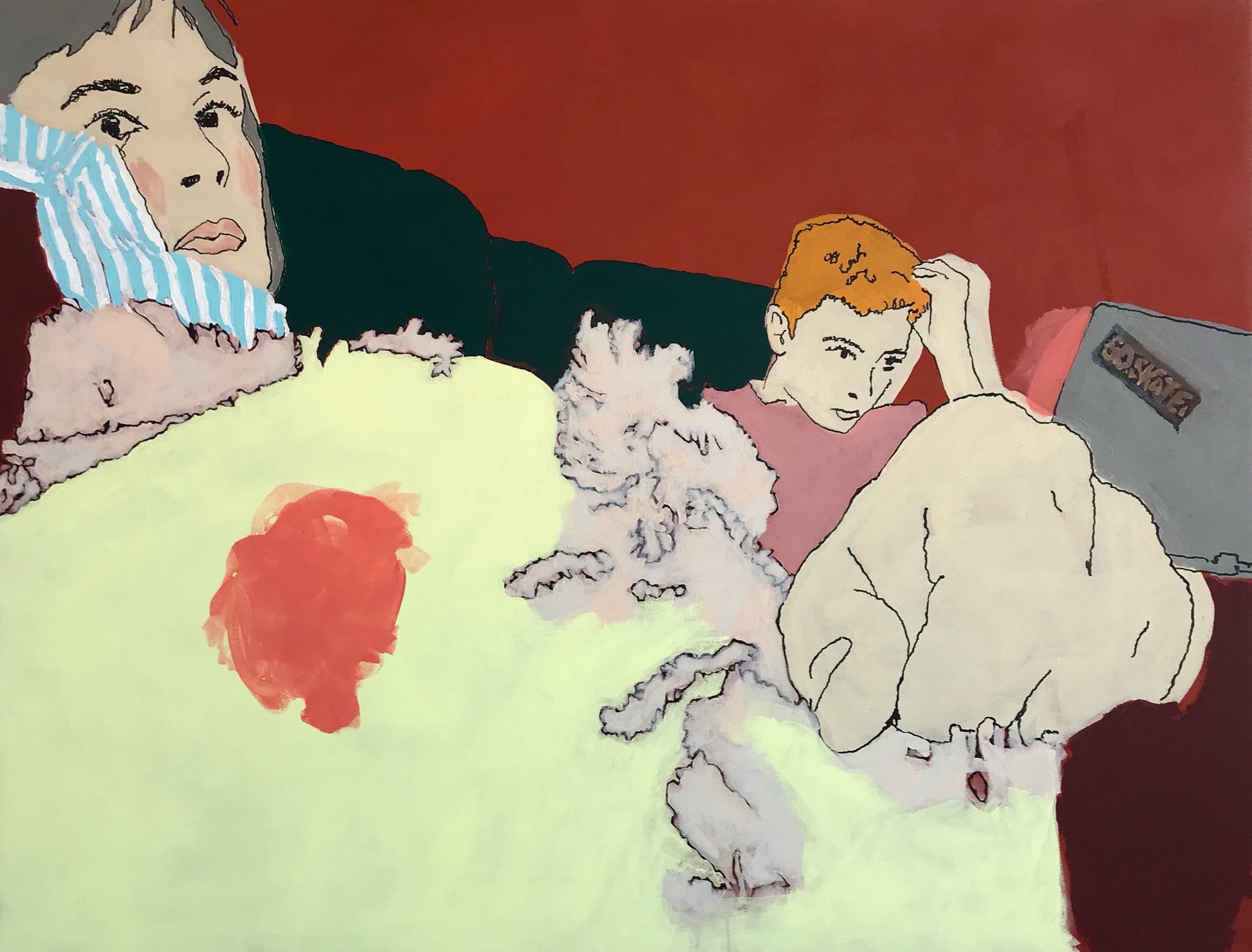Interview with Mychaelyn Michalec
Mychaelyn Michalec
She knows she is right, but to say she is right is wrong, 2018
Acrylic on canvas
60 x 46 in.
Mychaelyn Michalec is a Dayton, OH based painter who depicts ultramodern scenes of domestic life. She has received degrees in Art History and Fine Art from Ohio State University and graduated with a masters in Library and Information Science from the University of Southern Mississippi. In this interview, she speaks to guest juror Martin Mayorga of DATEAGLE ART about the influences in her work, what it’s like being an artist in Dayton, OH, and how she utilizes Instagram.
Martin: I’d like to know more about your work/life relationship, given that your work reflects directly on your family life, and your studio is located at your own home. Do you ever separate your personal life form your work and vice-versa?
Mychaelyn: My work is my life, in the sense that it is about it. But my life isn’t my work, meaning that I'm not so obsessed with documenting what is going on around me that I never live in the moment. One thing about being autobiographical and focusing on technology and disconnection is that I am more conscious about being disengaged.
Martin: After graduating, you took a break from being a practicing artist and worked in the arts. How long was this break, and why did it take you so long to come back to making art? Has working in the arts been beneficial to you as an artist?
Mychaelyn: I took a break of more than a decade. It is true that I was working in the arts, and for me, that kept me satisfied enough to not make any work of my own. I think that time was valuable for me because I did learn how arts organizations worked, grant writing, and a lot of back end stuff like website management. But then, I quit working when I had children. I struggled with the value of my role, while being identified only as a stay at home parent. When my children were young, it was emotionally and physically draining, and I just didn’t have it in me to make work.That is why my work now focuses so much on domestic life.
Martin: Your work is very much influenced by the domestic, in terms of the settings, environments, and actions. What are you trying to reflect with the everyday scenes that you depict?
Mychaelyn: I often think about an article that I read in Harper’s Magazine by Christine Smallwood called ‘Never Done, The impossible work of motherhood’ where she compares the creative process (of writing) to being a parent:
“A child is not a draft. You can not delete and start again. But there are some rhythms the two tasks share. Both are arts of attention. And in both, time is experienced as an all-consuming present. It is impossible to really remember anything outside the current moment, possible to spend a day writing and a day with a child and end both with no idea what happened and nothing to show for it.”
Martin: And how does your family react to your works?
Mychaelyn: I think that my family is quite used to the whole process. For them, they don’t know any different, it’s just the way it has always been.
Martin: Something that I quite enjoy from your work is the way you play with perspective. Can you explain this further?
Mychaelyn: Everything is from my perspective, I hold the camera at such an odd level to both be discreet and noninvasive. Sometimes, I let others see that by including myself in the work. But I think that I play with the perspective because it makes it more intimate yet simultaneously unfamiliar.
Martin: How is life as an artist in Ohio, are studio spaces accessible? What about the art scene over there? Does this influence you somehow?
Mychaelyn: There are some great things about living in a moderately sized Midwest town. It is affordable, there is not a ton of distraction, and there is plenty of available unused industrial space. The arts community is very small, and there are limited places to show, but I’m not sure how much of a disadvantage that is any more with the internet making you aware of every art space and opportunity out there. I hope that in the future we will see a lot more artists choosing to live here, because it has all the elements of building a great community.
Martin: I’m hooked to your process, where you connect to some things in order to disconnect from others, those choices “shape our lives” in your own words. Can you tell me more about this?
Mychaelyn: Distraction has always been a defining dynamic in any relationship, but technology has increased distraction. What we choose to connect to is essentially what life is about. It is a constant succession of choices that make up life. That’s why I say that these choices shape our lives.
Martin: There’s a particular order in your process which involves living your life, seeing a moment, capturing it with your phone, drawing it on paper, and then reflecting this into a canvas. Are you conscious about this rhythmic trajectory? Do you ever remove or add stages to this process?
Mychaelyn: I am aware that I am dependant on my process. There are many steps to follow. But I think there is something to be said about the importance of the seemingly mundane moments of our lives, and the steps that I take to consider those in my process.
Martin: Your work is both abstract and detailed at the same time. How do you balance this use of elements?
Mychaelyn: I think that paintings are just like life, in that we are constantly choosing what is more important, what to play down, what to focus on. When I am drawing an image, I think I choose to make everything equally important, but when I paint, I am frequently choosing the balance between the two.
Martin: You have a massive archive of your own drawings, as this is the main starting point of your work. What is your criteria at the time to select which drawings are going to be pushed further into a painting?
Mychaelyn: Lots of images make good drawings, but not every image makes a good painting. Figuring that out is a sort of trial and error sometimes. There are images that I’ve tried to make paintings out of, but they just don’t work in the end. One that I have tried to do multiple times is a drawing of my son showing the dog the images on his phone with my husband in the background. I’ve never been able to make it just right. So, I’ve painted over three attempts.
Martin: Social media platforms serve as a sharing tool where one can stage-set their alter egos or chose to share a certain lifestyle with their viewers. In this context, do you respond with a critical view towards these staged actions, in particular, of parents? And apart from the brutal honesty, is there a ‘staged’ element to your works?
Mychaelyn: I think that social media lends itself nicely to adults regressing to a sort of personal fable- a stage of development where people believe they are special and unique, so much so that none of life's difficulties or problems will affect them. As someone who has chosen to be a stay at home parent, I look at ultra curated social media portrayals of family life with a critical eye. I am not saying that the focus of my work is not as egocentric as other people, but it is definitely not saccharine. I think the most “staged” element for me is the fact that I am aware of the camera, and I choose the moments, how they are framed, and whether I participate in the scene or not. But truely, I am more interested in things that are actually happening around me, rather than a posed portrayal of family togetherness. I am most interested in what people choose to connect or disconnect from in their own lives.
Mychaelyn Michalec
I said I knew what we had, that it would still be there when I got back, 2018
Acrylic on canvas
46 x 60 in.
Martin: Many of your paintings seem unfinished due to the use of abstracted space, without paint in between elements. Is this something you make on purpose?
Mychaelyn: I think probably the most “staged” element of my work is how I deal with space. I believe that those abstracted spaces create drama, a confusion, and an intimacy in the space. It is something I do intentionally, though there is not a formula for it, it is more a painterly encounter within the piece.
Martin: I know that you are very attached to painting as your primary medium. Still, are you interested in experimenting with other mediums and techniques?
Mychaelyn: Painting is my first love, but I have been experimenting with textiles a bit in my work. I have been using an industrial rug tufting gun to create some textile pieces which is quite exciting.
Martin: I have to say that your Instagram account looks fantastic! Involving a mix of DIY’s, installation shots, sketches, final works…What are your thoughts on the role of social media for artists?
Mychaelyn: Thanks so much. Instagram is an extension of the arts community for me. Not only do I share my process, experiments, and finished works, but I get to keep in touch with a larger community of people, and see what they are working on, and sometimes receive feedback. It makes it a lot less isolating being an artist in a more remote area of the country, and it keeps me in touch with galleries and other artists.
Martin: Your work is a reflection of your life. So I ask myself, as your life progresses, will your works do so too? What’s going to happen when your children go to college, if you move houses, or if you travel?
Mychaelyn: I am not sure how my work will change, but I realize that it very much will. My oldest will be starting high school next year, and my youngest only has a year of elementary school left. The dynamic is quickly changing in our house, and their increased independence leaves my husband and I with longer periods of time to ourselves. Sometimes, I joke that I will stalk my children’s lives from a distance while they are at college like some deranged helicopter parent, just to have some material for my work. I guess only time and experience will tell.


